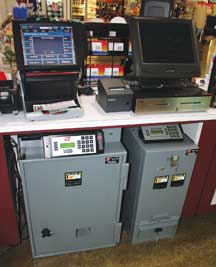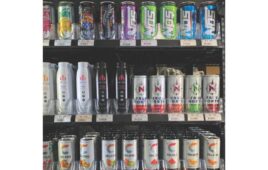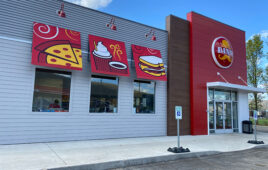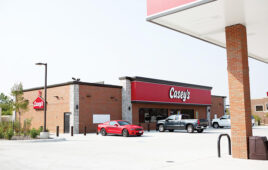 The newest safes and interactive security systems, including those that tie neatly into a point-of-sale (POS) system, can help operators track cash and monitor employees on a shift-by-shift basis.
The newest safes and interactive security systems, including those that tie neatly into a point-of-sale (POS) system, can help operators track cash and monitor employees on a shift-by-shift basis.
By Howard Riell, Associate Editor.
Follow the money is good advice when it comes to unraveling conspiracies, but it is even more important when it comes to running a convenience store.
Store safety and security are always prime concerns for retailers. Investing in new technology can make operators feel like their stores are secure, but at the end of the day, retail security experts insist, it’s the human element that must take precedence.
Jerry Smith, the principal of J. Smith Business Consulting in Appleton, Wis., said he likes systems that allow managers to connect transactions to the employees who made them. “That way you can go ahead and narrow things down. You’ve got some good team members out there, obviously, but every once in a while you’ve got to check up on them. And when you can get a ‘snapshot’ of each team member at the time of every transaction, it’s very good for theft recovery.”
Operating Effectively
The very real drawback of such systems is that employees come to feel that they are suspects under surveillance. To counteract that sentiment, said Smith, operators need to sell the message that it is all being done in the name of employees’ personal safety.
“But it’s a bit of a loaded gun,” Smith warned, “You really have to use some diplomacy and make sure you’re being honorable to the employees as far as what you’re doing. Those are the people on the front line for you and your brand, so we have to show that we sincerely trust them. But when there’s a void in the shift and you are losing money at a particular timeframe you have to narrow it down and minimize your loss.”
Ira Somerson, president of Loss Management Consultants Inc. in Upper Gwynedd, Pa., said the No. 1 mistake that c-stores make when handling cash, is allowing more than a certain predetermined amount of cash to be in the drawer and visible to the customers. “The systems aren’t the problem. The problem is always the people. When the employee doesn’t drop cash like he’s supposed to, the whole system fails.”
Viewing cashiers from remote locations serves little practical purpose, according to Somerson, whose resume includes more than 40 years of comprehensive security management consulting services. “I guess it could be helpful if you’re really paranoid,” he said. “TV is not all it’s cracked up to be. There is a lot of room for error, it’s very expensive, very time consuming and the same results can be achieved a lot more economically.”
Even better, the prices of these digital systems are coming down, making them not only more affordable but easier to integrate into existing POS systems. Walters-Dimmick Petroleum Inc. in Marshall, Mich. has had an Internet-based security system in place for the past six years. It was originally considered, and ultimately purchased and installed, because the VHS tapes its stores were using were considered unwieldy by management.
“The older systems lacked a lot of efficiencies,” said Dale Williams, director of operations and information technology for Walters-Dimmick Petroleum Inc. “We started rolling out DVRs and connecting them to the Internet, so we were able to view (operations) over the Internet. We’re using several different manufacturers to accomplish that.”
The current system allows management to track and record each transaction with a cash register interface, with which most of its stores have been outfitted. The company operates 63 stores and oversees another 29 run by dealers.
Since the newer systems, such as those offered by industry leaders like Gulfcoast Software, are more accurate and fit seamlessly into the c-store, they have made a marked improvement in internal theft. Not only do employees realize they are being monitored for their own safety, they recognize that their own actions will be recorded on tape, making it easy to identify the source of theft.
These types of retail solutions are becoming more commonplace as they become more affordable. Gulfcoast Software Solutions, for example, produces turnkey virtual retail management tools that can monitor activity at multiple locations anywhere in the country simultaneously and in real time. These leading edge solutions feature multiple device data mining and a broad range of event driven, local and enterprise tools that simplify operations and pinpoint questionable activity for action. In other words, retailers have options to eradicate internal theft.
Safe and Secure
Like Somerson, Smith hasn’t seen what he considers significant advances in safes. Among the major cash management mistakes that convenience store operators tend to make is thinking that they need to have two people scheduled at all times, Smith suggested. “I know that’s a safeguard that people like to have, but you’re better off investing in security and cameras equipment, and not simply saying, ‘Well, I’ve got two people there.’ Too many retailers are disconcertingly casual with cash.”
For example, Smith added, there are times when you can walk into a store and see employees counting cash right out in front of the customers. “Criminals notice things like that,” he said. “The culprits are looking for trends that are occurring, so that’s a big no-no. You should always be facing the door with some kind of a barrier between you, so you can count the cash properly.”
A common problem, and perhaps the most common of all, is employees leaving too much cash in their drawers. “That’s something you really need to take disciplinary action on for the employees’ safety,” Smith said.
Another cash management error that many c-store operators are still making is sending their managers out to the banks with sacks of money to make deposits, Smith said. “This, to me, is just unbelievable. I know it’s expensive to hire an armored truck, but I believe in having a service to pick up and drop off your deposits as often as possible. You have to understand that there are criminals out there who are looking for common trends, and they’re going to pick up who’s leaving your store with money if it’s not an armored service.”
Another costly miscue is when ownership fails to utilize security tapes properly. “There are all kinds of sweetheart deals going on where merchandise is being given away and no charges are being made,” Smith said.
Too many store employees are schooled in ways to bypass cash registers. “There are people who have sophisticated counting systems by the register, so they collect the money, but then don’t ring up the sales,” Smith said. “Maybe they have pennies there representing different dollar amounts that they have rung up, and then they go ahead and stop ringing in guests and pocket some money.”
Back to Basics
There are many issues retailers should be concerned with, Smith said. For example, having a written policy in place for voids and adjustments. “That’s an area where you’ve got be strict on your policies as far as who can adjust transactions and who can void them,” he said.
Smith and Somerson both agreed that getting back to basics, even in the face of the latest technologies, is extremely important. Secure cash management, in Somerson’s view, means a protective Plexiglas barrier between customers and cashiers and transactions conducted via a pass-through drawer.
Having the local police department come in to check security systems can only prove beneficial, Smith added. “Let them give you kind of a scholastic grade on how you’re doing. My systems in the stores I have represented in the past have all been very strong. We were actually known in the police department for having a strong security system, and that is the kind of reputation for which you want to be known.”




